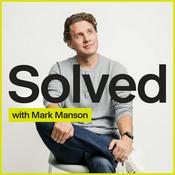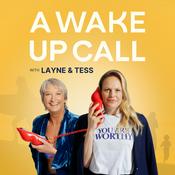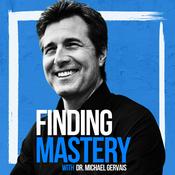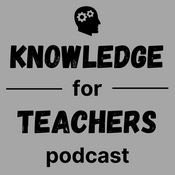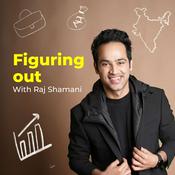220 episodes

Forget smaller or bigger. If you want better government, invest.
17/07/2025 | 45 mins.
Elizabeth Linos is the Emma Bloomberg Associate Professor for Public Policy and Management, and Faculty Director of The People Lab at the Harvard Kennedy School of Government. The majority of her research focuses on how to improve government by focusing on its people and the services they deliver. Specifically, she uses insights from behavioral science and evidence from public management to consider how to recruit, retain, and support the government workforce, how to improve resident-state interactions, and how to better integrate evidence-based policymaking into government. Her research has been published in numerous academic journals including Nature Human Behaviour, Econometrica, The Journal for Public Administration Research and Theory (JPART), The Journal of Political Economy, Public Administration Review, American Economic Journal: Economic Policy, Behavioural Public Policy, and others. Prior to joining the Harvard Kennedy School faculty, Linos has been an assistant professor at UC Berkeley; the VP and Head of Research and Evaluation at the Behavioral Insights Team in North America; and policy advisor to the Greek Prime Minister, George Papandreou, focusing on social innovation and public sector reform. Linos has been named one of the top 10 influencers in local government by ELGL, and was the 2023 recipient of the prestigious David N. Kershaw Award and Prize "established to honor persons who, before the age of 40, have made distinguished contributions to the field of public policy analysis and management."Ralph Ranalli of the HKS Office of Communications and Public Affairs is the host, producer, and editor of HKS PolicyCast. A former journalist, public television producer, and entrepreneur, he holds an BA in political science from UCLA and a master’s in journalism from Columbia University.Scheduling and logistical support for PolicyCast has been provided by Lilian Wainaina. Design and graphics support has been provided by Laura King. Web design and social media promotion support has been provided by Catherine Santrock and Natalie Montaner. Editorial support has been provided by Nora Delaney and Robert O’Neill.

Christiane Amanpour says objective journalism means pursuing truth—not neutrality
04/06/2025 | 29 mins.
Christiane Amanpour is chief international anchor of CNN’s flagship global affairs program “Amanpour,” which airs weekdays on CNN International and nightly on PBS in the United States. She is also host of “The Amanpour Hour,” and is based in the network’s London bureau. Beginning in 1983 as an entry-level assistant on the international assignment desk at CNN’s headquarters in Atlanta, Amanpour rose through the organization becoming a reporter at the New York bureau, and later, the network’s leading international correspondent. On the ground during the siege of Sarajevo, Amanpour exposed the brutality of the Bosnian War, reporting on the daily tragedy of life for civilians in the city. She was outspoken, calling out the human rights abuses, massacres and genocide committed against the Bosnian Moslems, later saying “There are some situations one simply cannot be neutral about, because when you are neutral you are an accomplice.” Throughout her time at CNN, Amanpour has secured exclusive interviews with global power players. In the wake of the September 11 attacks she was the first international correspondent to interview British Prime Minister Tony Blair, Pakistani President Pervez Musharraf and Afghan President Hamid Karzai. During the height of the Arab Spring she conducted an Emmy-winning interview with Libya’s former leader ‘Colonel’ Moammar Gadhafi, and she was also the last journalist to interview Egypt’s President Hosni Mubarak just before he was deposed. In January 2014, Amanpour also exclusively broke the news of a dossier of testimony and photographs which alleged to show systematic torture of prisoners by government forces in Syria, evidence she used to confront Russian Prime Minister Dmitry Medvedev about his government’s support for the Assad regime. In addition to her work as an anchor and reporter, Amanpour is an active rights campaigner. A board member of the Committee to Protect Journalists, the Centre for Public Integrity and the International Women’s Media Foundation, she has used her profile to raise awareness of key global issues and journalists’ rights. She has interviewed educational rights activist Malala Yousafzai for CNN on several occasions – bringing focus to her courage and international advocacy work. Amanpour has earned 16 News and Documentary Emmy Awards, four Peabody Awards, two George Polk Awards, three duPont-Columbia Awards and the IWMF’s Courage in Journalism Award. She has received nine honorary degrees, is an honorary citizen of Sarajevo, and a UNESCO Goodwill Ambassador for Freedom of the Press and the Safety of Journalists. Amanpour holds a BA in Journalism from the University of Rhode Island.Ralph Ranalli of the HKS Office of Communications and Public Affairs is the host, producer, and editor of HKS PolicyCast. A former journalist, public television producer, and entrepreneur, he holds an BA in political science from UCLA and a master’s in journalism from Columbia University.Scheduling and logistical support for PolicyCast is provided by Lilian Wainaina.Design and graphics support is provided by Laura King and Delane Meadows. Web design and social media promotion support is provided by Catherine Santrock and Natalie Montaner. Editorial support is provided by Nora Delaney and Robert O’Neill.

The Arctic faces historic pressures from competition, climate change, and Trump
16/05/2025 | 50 mins.
John Holdren is the Teresa and John Heinz Research Professor for Science and International Affairs at Harvard University’s Kennedy School of Government and co-director of the Science, Technology, and Public Policy Program at the School’s Belfer Center for Science and International Affairs. He is a former Professor of Environmental Science and Policy in the Department of Earth and Planetary Sciences, and Affiliated Professor in the John A. Paulson School of Engineering and Applied Science. He is also President Emeritus and Senior Advisor to the President at the Woodwell Climate Research Center, a pre-eminent, independent, environmental-research organization. From 2009 to 2017, Holdren was President Obama’s Science Advisor and Director of the White House Office of Science and Technology Policy, becoming the longest-serving Science Advisor to the President in the history of the position. Before joining Harvard, was a professor of energy resources at the University of California, Berkeley, where he founded and led the interdisciplinary graduate-degree program in energy and resources. Prior to that he was a theoretical physicist in the Theory Group of the Magnetic Fusion Energy Division at the Lawrence Livermore National Laboratory and a Senior Research Fellow at Caltech. He has been a member of the Board of Trustees of the MacArthur Foundation and Chairman of the Committee on International Security and Arms Control at the National Academy of Sciences. During the Clinton Administration, he served for both terms on the President’s Council of Advisors on Science and Technology, leading multiple studies on energy-technology innovation and nuclear arms control. He is a member of the U.S. National Academy of Sciences, the U.S. National Academy of Engineering, the American Philosophical Society, the American Academy of Arts and Sciences, the American Academy of Political and Social Science, and the Council on Foreign Relations. He is also a foreign member of the Royal Society of London and the Indian National Academy of Engineering and a former President of the American Association for the Advancement of Science. His many honors include one of the first MacArthur Prize Fellowships (1981) and the Moynihan Prize of the American Academy of Political and Social Sciences. In 1995, he gave the acceptance speech for the Nobel Peace Prize on behalf of the Pugwash Conferences on Science and World Affairs, an international organization of scientists and public figures. He holds SB and SM degrees from MIT in aeronautics and astronautics and a Ph.D. from Stanford in aeronautics and astronautics and theoretical plasma physics.Jennifer Spence is the Director of the Arctic Initiative at Harvard Kennedy School’s Belfer Center for Science and International Affairs, with expertise related to sustainable development, international governance, institutional effectiveness, and public policy. Spence currently co-chairs the Arctic Research Cooperation and Diplomacy Research Priority Team for the Fourth International Conference on Arctic Research Planning (ICARP IV), participates as a member of the Climate Expert Group for the Arctic Council’s Arctic Monitoring and Assessment Programme, and sits as a member of the Yukon Arctic Security Advisory Council. Spence was the Executive Secretary of the Arctic Council’s Sustainable Development Working Group from 2019-2023. Previously, she taught and conducted research at Carleton University and worked for a 2-year term at the United Nations Development Programme. She also worked for 18 years with the Government of Canada in senior positions related to resource management, conflict and change management, strategic planning, and leadership development. Spence holds a Ph.D. in public policy from Carleton University, a MA from Royal Roads University in conflict management and analysis, and a BA in political science from the University of British Columbia.Ralph Ranalli of the HKS Office of Communications and Public Affairs is the host, producer, and editor of HKS PolicyCast. A former journalist, public television producer, and entrepreneur, he holds an BA in political science from UCLA and a master’s in journalism from Columbia University.Scheduling and logistical support for PolicyCast is provided by Lilian Wainaina.Design and graphics support is provided by Laura King and the OCPA Design Team. Web design and social media promotion support is provided by Catherine Santrock and Natalie Montaner. Editorial support is provided by Nora Delaney and Robert O’Neill.

Moments that matter: How to bake fairness into the workplace
06/05/2025 | 43 mins.
Iris Bohnet is the Albert Pratt Professor of Business and Government and the co-director of the Women and Public Policy Program at Harvard Kennedy School. She is a behavioral economist, combining insights from economics and psychology to improve decision-making in organizations and society, often with a gender or cross-cultural perspective. Her most recent research examines behavioral design to embed equity at work. She is the author of the award-winning book “What Works: Gender Equality by Design” and co-author of the book “Make Work Fair.” Professor Bohnet advises governments and companies around the world, including serving as Special Advisor on the Gender Equality Acceleration Plan to the UN Secretary-General/Deputy Secretary-General and as a member of the Gender Equality Advisory Council of the G7. She was named one of the Most Influential Academics in Government and one of the most Influential People in Gender Policy by apolitical. She served as academic dean of Harvard Kennedy School for six years and as the faculty chair of the executive program “Global Leadership and Public Policy for the 21st Century” for the World Economic Forum’s Young Global Leaders for more than ten years. She presently serves as the faculty director of the social sciences at Harvard Radcliffe Institute and on a number of boards and advisory boards. Siri Chilazi is a senior researcher at the Women and Public Policy Program at Harvard Kennedy School whose life’s work is to advance gender equality in the workplace through research and research translation. She operates at the intersection of academia and practice, both conducting research on how organizations can become more inclusive and bringing those research insights to practitioners through speaking, training, and workshops. As an academic researcher, Siri specializes in identifying practical approaches to close gender gaps at work by de-biasing structures and designing fairer processes. As an advisor and speaker, Siri frequently collaborates with organizations ranging from start-ups to Fortune 500 companies and leading professional service firms in order to close gender gaps. Shei is the coauthor, with Iris Bohnet, of “Make Work Fair: Data-Driven Design for Real Results.” She has earned an MBA from Harvard Business School, a Master’s in Public Policy from Harvard Kennedy School, and a BA in Chemistry and Physics from Harvard College. Ralph Ranalli of the HKS Office of Communications and Public Affairs is the host, producer, and editor of HKS PolicyCast. A former journalist, public television producer, and entrepreneur, he holds an BA in political science from UCLA and a master’s in journalism from Columbia University.Scheduling and logistical support for PolicyCast is provided by Lilian Wainaina. Design and graphics support is provided by Laura King and the OCPA Design Team. Web design and social media promotion support is provided by Catherine Santrock and Natalie Montaner. Editorial support is provided by Nora Delaney and Robert O’Neill.

Crypto is merging with mainstream finance. Regulators aren’t ready
17/04/2025 | 55 mins.
Timothy Massad is currently a Senior Fellow at the Mossavar-Rahmani Center for Business and Government at Kennedy School of Government at Harvard University, an Adjunct Professor of Law at Georgetown Law School and a consultant on financial regulatory and fintech issues. Massad served as Chairman of the U.S. Commodity Futures Trading Commission from 2014-2017. Under his leadership, the agency implemented the Dodd Frank reforms of the over-the-counter swaps market and harmonized many aspects of cross-border regulation, including reaching a landmark agreement with the European Union on clearinghouse oversight. The agency also declared virtual currencies to be commodities, introduced reforms to address automated trading and strengthened cybersecurity protections. Previously, Mr. Massad served as the Assistant Secretary for Financial Stability of the U.S. Department of the Treasury. In that capacity, he oversaw the Troubled Asset Relief Program (TARP), the principal U.S. governmental response to the 2008 financial crisis. Massad was a partner in the law firm of Cravath, Swaine & Moore, LLP. His practice included corporate finance, derivatives and advising boards of directors. Massad was also one of a small group of lawyers who drafted the original ISDA standard agreements for swaps.Howell Jackson is the James S. Reid, Jr., Professor of Law at Harvard Law School. His research interests include financial regulation, consumer financial protection, securities regulation, and federal budget policy. He has served as a consultant to the United States Treasury Department, the United Nations Development Program, the World Bank, and the International Monetary Fund. He frequently consults with government agencies and congressional committees on issues related to financial regulation. From 2023 to 2024, he was a Senior Adviser to the National Economic Council. Since 2005, Professor Jackson has been a trustee of College Retirement Equities Fund (CREF). He has also served as a director of Commonwealth, a non-profit dedicated to strengthening financial opportunities for low and moderate-income consumers. At Harvard University, Professor Jackson has served as Senior Adviser to the President and Acting Dean of Harvard Law School. Before joining the Harvard Law School faculty in 1989, Professor Jackson was a law clerk for Associate Justice Thurgood Marshall and practiced law in Washington, D.C. Professor Jackson received his J.D. and M.B.A. degrees from Harvard University in 1982 and a B.A. from Brown University in 1976.Ralph Ranalli of the HKS Office of Communications and Public Affairs is the host, producer, and editor of HKS PolicyCast. A former journalist, public television producer, and entrepreneur, he holds an BA in political science from UCLA and a master’s in journalism from Columbia University.Scheduling and logistical support for PolicyCast is provided by Lilian Wainaina.Design and graphics support is provided by Laura King. Web design and social media promotion support is provided by Catherine Santrock and Natalie Montaner. Editorial support is provided by Nora Delaney and Robert O’Neill .
More Education podcasts
Trending Education podcasts
About PolicyCast
Listen to PolicyCast, The Rich Roll Podcast and many other podcasts from around the world with the radio.net app
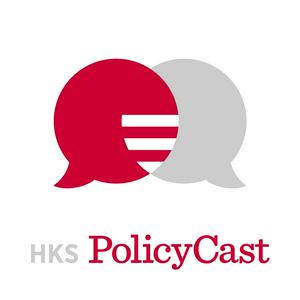
Get the free radio.net app
- Stations and podcasts to bookmark
- Stream via Wi-Fi or Bluetooth
- Supports Carplay & Android Auto
- Many other app features
Get the free radio.net app
- Stations and podcasts to bookmark
- Stream via Wi-Fi or Bluetooth
- Supports Carplay & Android Auto
- Many other app features


PolicyCast
download the app,
start listening.


